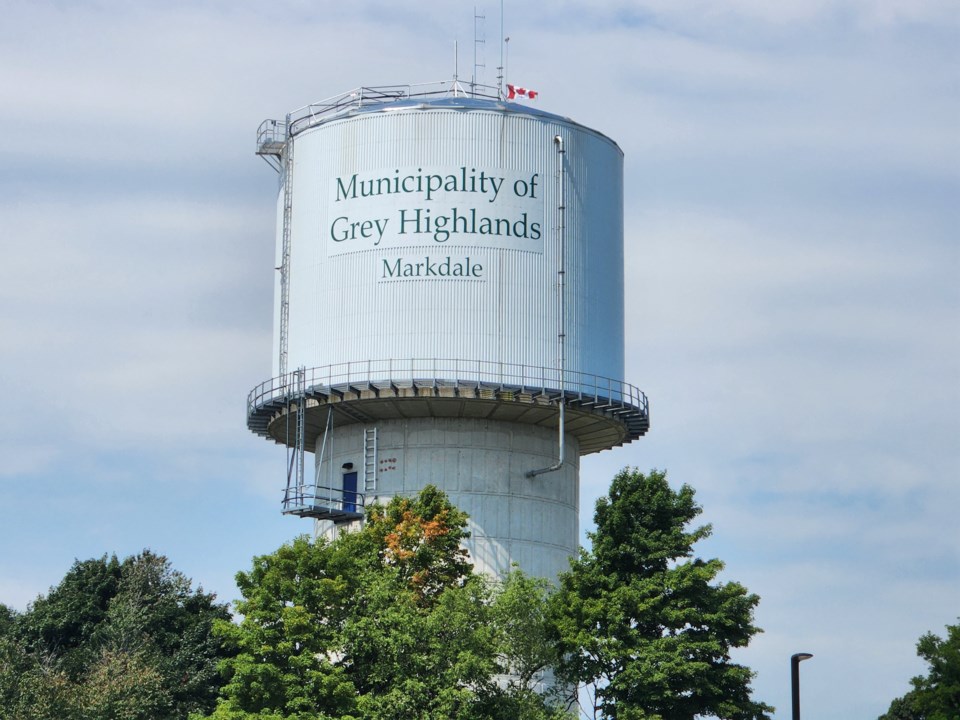The Municipality of Grey Highlands has taken its first steps towards the establishment of a formal policy for how municipal water and sewage capacity is issued to developers.
On Jan. 24, Grey Highlands council held a committee of the whole meeting to review a draft water and wastewater allocation policy for the municipality. The municipality is implementing a formal allocation policy as it nears its total available capacity at the Markdale sewage lagoon.
Grey Highlands has begun the reporting process for an eventual expansion of the lagoon’s capacity. However, a number of large proposed developments have come forward in recent years that - if fully built - would exceed the existing capacity.
The policy is required to ensure the municipality has a formal process in place to allocate the limited capacity to developers while the lagoon expansion project moves forward.
“We are approaching a crunch,” said Matt Rapke, manager of planning, on the looming capacity shortage at the Markdale lagoon.
The policy suggests the maximum allocation would be 200 units and a deposit of $1,000 per unit ($500 for water, $500 for sewage) would be required.
The policy would apply to all three areas (Markdale - water and sewage, Kimberley/Amik - water and sewage and Flesherton - sewage) of the municipality that have servicing available.
Other principles in the draft policy include:
1. The needs of different developments will be balanced against each other to best achieve the overarching objective of this policy.
2. Minor development is prioritized over major development.
3. Where multiple developments are competing for limited available capacity, allocation for infill development will take priority over greenfield development.
4. Where multiple greenfield developments are competing for limited available capacity, allocation for large-scale purpose-built rentals will take priority over capacity allocation for other housing types.
5. Where multiple greenfield developments are competing for limited available capacity, the priority will be to ensure that some level of capacity allocation can occur for each development.
6. Where multiple developments are competing for limited available capacity, developments that are closer to being ready for building permit issuance will take priority over developments that are further from being ready for building permit issuance.
7. The municipality will be reasonable in prioritizing the renewal of expiring capacity allocation provided the developer is maintaining an appropriate working relationship with the municipality and that the development is progressing at a reasonable rate.
The full draft policy can be found online here.
Council spent about three hours discussing the draft policy and various scenarios that could arise should it be implemented.
Councillors raised concerns about developers being required to pay a deposit to receive service allocations and having enough flexibility in the policy to respond to swings in the economy.
“We really need to look at this from all angles. There are a lot of things that can happen,” said Mayor Paul McQueen. “We need to have something in place, but we need it to be flexible to address a lot of circumstances that come about.”
Coun. Paul Allen said he couldn’t support charging deposits for allocations or having an expiry date on allocations.
“We need to work with the developers,” said Allen, noting that a maximum 200-unit allocation would be a $200,000 deposit. “Developers are investing millions and millions into a property, they should know that allocation is there.”
At the conclusion of the discussion the committee passed a resolution making three recommendations to council. They are:
- A definition be created in the policy to address allocations for commercial/industrial developments.
- The expiration date for allocations granted to minor developments is changed from six months to one year.
- That staff consult the development community for comments and feedback on the draft policy and report back to council on the results.
Rapke said staff intends to move as quickly as possible on getting the policy in place. He noted that several Markdale developments would likely be asking for servicing allocations in the near future.
“There are going to be a lot of asks the next couple of months,” said Rapke. “We are going to have to make decisions really soon.”


